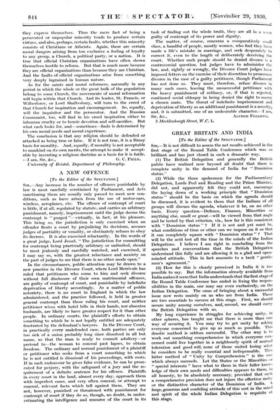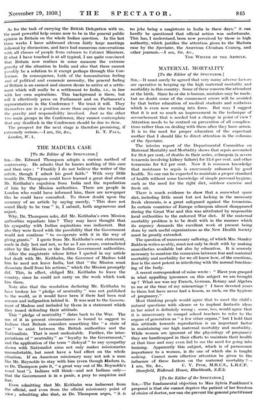GREAT BRITAIN AND INDIA
[To the Editor of the SPECTATOR.]
Sza,—It is not difficult to assess the net results achieved in the first stage of the Round Table Conference which was so brilliant and has just closed in such a dramatic way.
(1) The British Delegation and generally the British public have realized now beyond all doubt that there is complete unity in the demand of India for "Dominion status."
(2) While the three spokesmen for the Parliamentary Delegation, Lords Peel and Reading and the Prime Minister, did not, and apparently felt they could not, encourage the laying down of a working principle that "Dominion status" should be the basis on which the agenda should be discussed, it is evident to them that the Indians of all groups will discuss the agenda, whatever it be, on no other basis. Every question—Defence, Finance, Minorities or anything else, small or great—will be viewed from that angle and be tested by that criterion, viz., how far is this consistent with "Dominion status" '1 If it is not and yet must be, what conditions of time or other can we impose on it so that it can completely square with "Dominion status " ? That will be the acid test all the time in the minds of the Indian Delegations. I believe I am right in concluding from the speeches and conversations that the British Delegation understand this fully and are allowing it in a glad and open- minded attitude. This in fact amounts to a tacit " gentle- men's agreement."
(3) How far this is clearly perceived in India it is Me possible to say. But the information already available from India makes it seem that India understands that the first stage of the Round Table Conference has ended in fixing the respon- sibilities in the main, one may say even exclusively, on the Indian Delegation. The onus of bringing about a successful issue now rests mainly on us who are from India. There are two essentials to success at this stage. First, we should secure unity among ourselves, and, second, we should carry the British Delegation with us.
My long experience in struggles for achieving unity, in other spheres, has taught me that there is more than one way of securing it. You may try to get unity by asking everyone concerned to give up as much as possible. This drastic method is seldom successful. The other way is to work out something comprehensive in which everyone con- cerned could live together in a neighbourly spirit of mutual
toleration and good will, none of those united losing what he considers to be really essential and indispensable. This bitter method of "Unity by Comprehension" is the one which always succeeds. Let the States or the Minorities or "special interests" have what to them in their fuller know- ledge of their own needs and difficulties appears to them, in all honesty, to be absolutely necessary, provided that such a comprehensive provision does not injure the effective unity or the distinctive character of the Dominion of India.A large, generous and confiding attitude of this sort in the mind and spirit of the whole Indian Delegation is requisite at this stage. As for the task of carrying the British Delegation with us, the most powerful help seems DOW to be in the general public opinion in Britain on the whole Indian question. In the last three weeks I have addressed eleven fairly large meethigs followed by diseu.ssions, and have bad numerous conversations with all classes of people from cabmen to Cabinet Ministers. If what I have touched is at all typical, I am quite convinced that Britain now realizes in some measure the extreme gravity of the situation in India and also that there cannot sossibly be a solution to it except perhaps through this Con- ference. In consequence, both of the humanitarian feeling and of political and economic necessity, the general feeling of Britain is an earnest and sincere desire to arrive at a settle- ment which will really be a settlement to India, i.e., in line with her own aspirations. This background is there, but will it effectively press on Parliament and on Parliament's representatives in the Conference ? We trust it will. They themselves are in a position more than anyone else to realize the gravity and responsibility involved. Just as the other two main groups in the Conference, they cannot contemplate that any deadlock in the Conference should be due to them. The prospect for the next stage is therefore promising, if











































 Previous page
Previous page